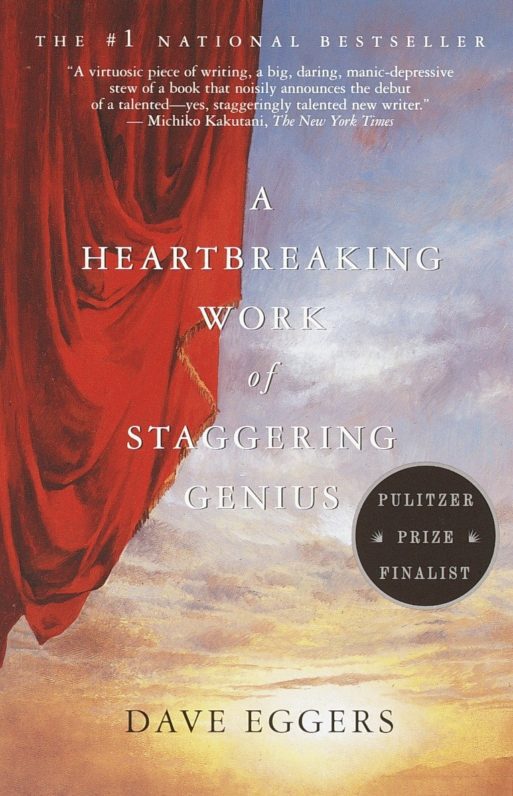 Through his popular memoir, A Heartbreaking Work of Staggering Genius, San Francisco author Dave Eggers chronicles his experience raising his younger brother Toph after the family loses each of their parents to cancer. The book is, indeed, at times heartbreaking and staggering. Watching Dave and his older sister navigate their unexpected circumstances while maintaining much of the normal life of a couple of wayward twentysomethings is inspiring – with an occasional pang of pity as we’re reminded of the cause of this series of events.
Through his popular memoir, A Heartbreaking Work of Staggering Genius, San Francisco author Dave Eggers chronicles his experience raising his younger brother Toph after the family loses each of their parents to cancer. The book is, indeed, at times heartbreaking and staggering. Watching Dave and his older sister navigate their unexpected circumstances while maintaining much of the normal life of a couple of wayward twentysomethings is inspiring – with an occasional pang of pity as we’re reminded of the cause of this series of events.
The subject of the memoir and the characters in Eggers’ life are riveting. Everything is slightly unusual – a young man raising his little brother, hanging with Berkeley hippies and artists, living on life insurance and inheritance, working with friends to create a new arts magazine in the nineties – but somehow relatable – the relationships of the siblings, the dreams of young artists, the attempts to fit in and still be remarkable in a new home. The book opens with a graphic account of the moments before the mother’s death, and I would have closed it immediately had the book not been so highly recommended. This graphic introduction is, in fact, the most heartbreaking of all, detailing the young man’s panic, bravado, and strange thoughts as he watches the cancer take his mother, the final remaining point of authority and sanity in his family.
Eggers’ memoir is intriguing more because of how little he talks about losing his parents, yet how much of the experience he portrays. The story does not dwell on the grief and loss in the family, despite how devastating a time this must have been for the author and his siblings. The majority of the story is, instead, details of the boys’ day-to-day life, staying very confined inside of the author’s ego. Rather than an account of a loss, this memoir is an account of a life – one in which a loss was a brief but pivotal circumstance.
This confinement to the author’s ego does make the book difficult to digest at many points. The writing is of that variety that makes a reader question, “Is this genius or insanity? The line is so thin…” Eggers often takes off into unwieldy pages of stream-of-consciousness that sometimes do the job of exploring the real madness that rightly filled his young mind, but sometimes leave me begging, “Please, get to the point!” But the penetrating passion of the story inevitably propels me forward, and I could never succumb to my occasional frustration and put the book down. The book’s initial success and continued popularity is well-deserved. I would recommend it especially to Bay Area readers, who will best understand the recurring local references; but also to anyone interested in a very unique account of life after a loss.

 “A Heartbreaking Work of Staggering Genius” by Dave Eggers
“A Heartbreaking Work of Staggering Genius” by Dave Eggers


 Funeral Favors Offer Visitors a Tangible Memento
Funeral Favors Offer Visitors a Tangible Memento
 “Comeback” by Prince
“Comeback” by Prince















